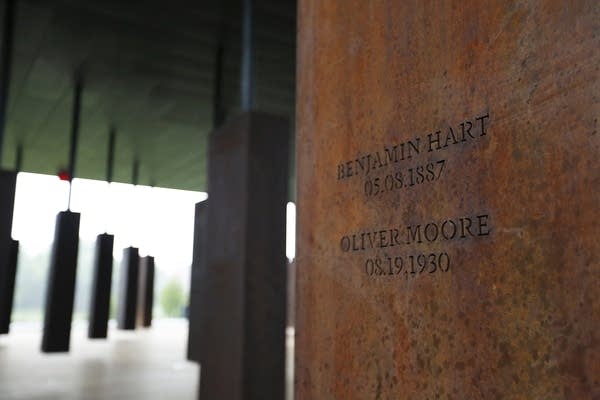Duluth to Montgomery: 'It's going to be painful and exciting'

Carl Crawford admitted to feeling "a million emotions" before boarding a bus Tuesday evening. He's part of a group of nearly three dozen heading from Duluth, Minn., to Montgomery, Ala., to attend the opening day of a new national memorial that highlights the history of lynching in the United States.
The round trip will span thousands of miles through eight states, bookended by memorials for victims of lynching. In Duluth, three circus workers were accused of raping a woman whose story was never found to be credible. In Montgomery, it will be those circus workers, along with every other documented case of lynching the Equal Justice Initiative has been able to document in recent years.
The group's investigations have found more than 4,000 people murdered in over 800 counties by mobs who took the law into their own hands, and they expect to find more. The African-Americans killed were accused — usually incorrectly or after-the-fact — of crimes against white people.
The travelers settled in for a long overnight bus ride with the movie "Fences" showing on screens above the seats and clementines being passed around, scenting the air with citrus.
Create a More Connected Minnesota
MPR News is your trusted resource for the news you need. With your support, MPR News brings accessible, courageous journalism and authentic conversation to everyone - free of paywalls and barriers. Your gift makes a difference.

Crawford was in a jovial mood, but he knew that wouldn't last. "It's going to be emotional, without a doubt," he noted. "We're looking into lives that were lost, cut short.
"People that could've really made a difference in this world — we'll never know. All because of race and gender."
Crawford serves as Duluth's human rights officer, a job that enforces city and state human rights laws. He said he's seen images of what the new memorial looks like, but fully expects to be overwhelmed in person.
In remembering the victims of lynching, 6-foot pillars will hang above visitors to replicate the way victims were hanged from trees or, in the case of Minnesota's only recorded lynching, a light pole.

By connecting a memorial in Duluth that marks one incident of lynching with a national memorial that tries to encompass all of them, Crawford expects to return from the trip "with a bigger sense of being part of something larger than Duluth."
While the Duluth memorial remembers Elmer Jackson, Isaac McGhie and Elias Clayton, the national memorial will be a chance for people to understand the similarities between lynchings. More than a quarter of all lynchings documented by the EJI saw justifications for killing the black men and women made up after-the-fact. Irene Tusken, the accuser in Duluth, claimed she was raped but a doctor at the time said he found no evidence of that.
Of the more than 800 counties represented in the new memorial, St. Louis County is one of the few in northern states, and the only one in Minnesota to have a lynching documented.

While some of the people responsible for the lynching were later charged with crimes related to inciting a riot, no one ever faced charges for the murders. Minnesota lawmakers passed an anti-lynching law almost exactly a year after the 1920 hangings.
The pillars on display at the new memorial in Alabama all have duplicates, and each community will be invited to bring back a pillar to display and show they're working to own their histories. Duluth already has a memorial to its lynching, dedicated on October 10, 2003, and believed to be the first such memorial erected in the country. Even so, city leaders including Crawford, expect to bring their pillar home.
Correction (April 25, 2018): A previous version of this story reported an incorrect number of counties represented in the memorial and misspelled Irene Tusken's name. The story has been updated.